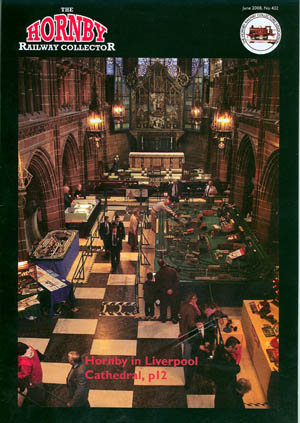Toy Story
| For some
reason I have never quite fathomed there is something
about clergy and railways that go together. In my
case it is collecting, and running when possible,
original Hornby O gauge and Hornby Dublo model
railways. I am a member of the Hornby Railway Collectors
Association. A recent edition of the Association's magazine arrived with a splendid picture on the front cover in full colour of the Lady Chapel at Liverpool Cathedral. Earlier this year in the Lady Chapel, laid out for all to see, were all things Hornby: trains as well as Meccano and Dinky toys. The link is twofold. Frank Hornby, often claimed to be the world's greatest toy maker, was born, worked and died in Liverpool. This year Liverpool is the European City of Culture. Toy making is all part of our culture and deserves to be part of this year's celebrations and events. Disciples of Frank Hornby will know that Binns Road, Liverpool, was where it all happened. It was there that Frank Hornby had his Meccano factory. Binns Road is still there. It is just up a bit from where my sister-in-law, Vicky Williams, lives. When we visit we sometimes drive along the sacred tarmac for old times' sake. The disappointment is that there is absolutely nothing to show now in Binns Road for all those years of endeavour in toy-making. It is as though the factory never existed. |
 |
The magic of toys for old codgers like me is that they take you back to your childhood. I get an almost tangible reminiscence somewhere inside me when I get out the tin plate rolling stock and cast locos of the 1950s Hornby railways that I collected as a boy. They still work and bring a great deal of pleasure.
The Liverpool Hornby exhibition could have taken place in any old drill hall that might have been available. But someone had the imagination to bring it into the Cathedral. That is because at least two things are sacred.
Childhood is sacred because it is the foundation of adult life. Childhood is part of us in its own right, but it also leads on to the rest of life. There will be some rough and tumble in childhood but if it can be a secure, happy and truthful time, as it should be, children will grow into full human maturity.
We get some terrible snapshots through the media today of the abuse of children. Only those who have endured abuse can know what it's really like. The protection of children is rightfully a community priority. If when you revisit your childhood there is nothing there, as there is nothing to see now in Binns Road, it can be a very painful experience. Relationships and events have been blocked out or disappeared, too painful to recall.
Being absorbed as a child in play, and learning through it, is an important foundation on which to build. It is why we remember and still sometimes pursue childhood activities. They remind us of an early and secure time. The Playlink Scheme at Leatherhead Children's Centre is a contemporary and local recognition of the importance of play in human development. Childhood is a sacred time because of all it lays down for future life. It shapes us and moulds us.
Work is also sacred. We are creators made in the image of God who created all that is. Binns Road was a factory, even if for some people it was also a shrine. Photos from that time show factory workers making, testing and packing a product. Working doesn't always get a good press and manufacturing in the UK has declined in the world market. Without work there would be no wealth creation. It is the bedrock of a sound economy. Today the UK has become service industry orientated. Manufacturing has moved away to where labour costs are cheaper. Entrepreneurs like Frank Hornby took risks and invested a great deal in creating a workplace.
Those who ran stalls at the Liverpool Cathedral exhibition reported meeting with many ex-employees of Meccano. Onestallholder recalled: "Quite a few people did express resentment at the very abrupt nature of their dismissal at the time of closure (of Binns Road), whilst recognising that, in those days things were done that way."
Work is a human activity and there are clearly winners and losers. There can be great disparity in risk and return. It is part of the outworking of a market economy, which has now become the universal economic system. It is a system which is good producing prosperity. But it isn't good at distributing that prosperity evenly.
Whether that is across the world as a whole or within our own country. Risk-takers deserve their return but so too do producers. Fair Trade is a movement to ensure that Third World producers get a fair share in the prosperity they are helping to produce. Many people now believe that there is too big a gap between high and low earners from the market economy and globalisation we are all caught up in.
All economic systems have their downside. The challenge we currently face is how to get a better balance in those returns around the world and in our own country. It is not good for community or democracy that some people and organisations are very well off and others poor and sometimes destitute. Work is a sacred activity which at best will be governed by principles and practices that have at their heart the highest of ideals and concerns for everyone involved.
Canon David Eaton, from the July 2008 magazine